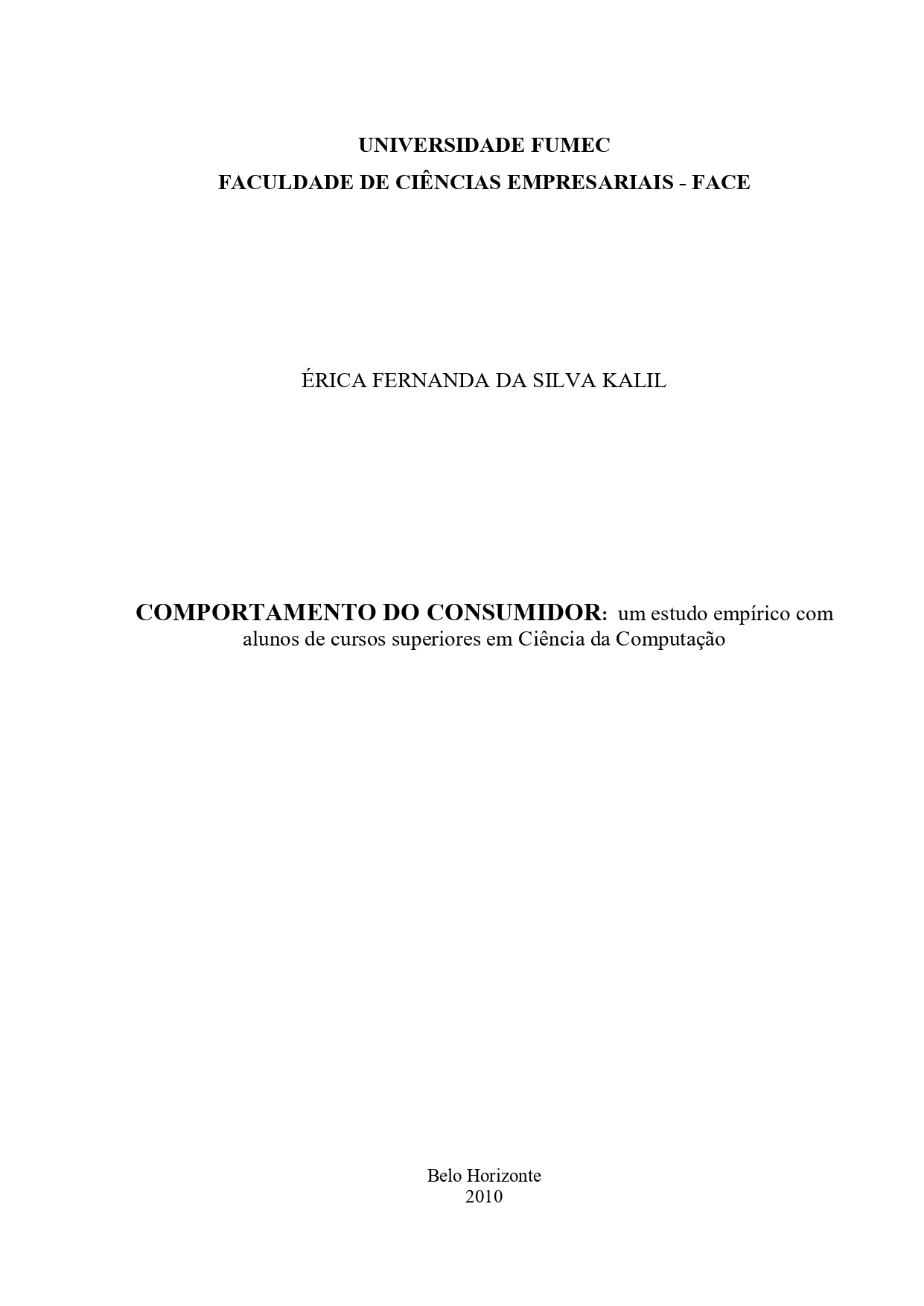Comportamento do consumidor: um estudo empírico com alunos de cursos superiores em ciência da computação

Visualizar/
Data
2010Autor
Kalil, Érica Fernanda da Silva
xmlui.mirage2.itemSummaryView.MetaData
Mostrar registro completoResumo
Este trabalho procurou discorrer sobre o comportamento do consumidor, em especial alunos de graduação, a respeito do processo de escolha do curso de Ciência da Computação. Foram descritos os conceitos e fases do comportamento do consumidor segundo Engel, Blackwell, Miniard (1995, 2000), Kotler (1998, 2000) e Sheth, Mittal e Newman (2008). A partir do modelo das etapas do processo decisório de compra proposto por Engel et al. (1995, 2000), o objetivo geral foi avaliar o comportamento do consumidor (alunos) do curso de Ciência da Computação nas fases de busca de informação e avaliação das alternativas. Os objetivos secundários visaram a: a) identificar as principais fontes de informações para escolha de Instituições de Educação Superior (IES); e b) verificar os elementos de maior relevância na escolha dos cursos (características dos cursos e IES). De forma a cumprir os objetivos, realizou-se pesquisa quantitativa com alunos do curso de Ciência da Computação de uma IES privada em Belo Horizonte, sendo colhidos 208 questionários. Dos resultados principais, citam-se: busca de informação - a Internet foi a mais utilizada; avaliação das alternativas: curso/profissão – fatores: a) profissionais (bons empregos e salários, carreira do futuro); b) sociais (boa aceitação e recomendação de pessoas conhecidas, amigos e parentes que fizeram o curso); c) pessoais (por gostar do curso e de áreas afins); e d) conveniência (dificuldade de passar no vestibular para o curso de primeira opção e facilidade de passar no vestibular em Ciência da Computação); avaliação das alternativas: IES - valor do diploma no mercado, marca e reputação, qualidade de ensino, professores e infraestrutura; avaliação das alternativas: programa do curso – excelentes professores, laboratórios e infraestrutura. Podese dizer que o desenvolvimento deste trabalho ajudou a gerar um conhecimento específico sobre o comportamento dos consumidores alunos de Ciência da Computação e que a replicação dessa pesquisa em outras IES acrescentaria outros benefícios para a amostra. This study is on consumer behavior, particularly graduate students, about the process of choosing the Computer Science course. The concepts and phases of consumer behavior were described according to Engel, Blackwell, Miniard (1995, 2000), Kotler (1998, 2000) and Sheth, Mittal and Newman (2008). From the model of the stages of the decision-making process of buying Engel et al, (1995, 2000), the overall objective was to evaluate the behavior of consumers (students) from the Computer Science course at the information search phase and the evaluation of alternatives and the secondaries aimed: a) identify the main sources of information for the IES choice, and b) verify the elements of greatest importance in the choice of courses (course characteristics and IES). In order to meet the goals, a quantitative research with students of the Computer Science course from an IES private Institution in Belo Horizonte was carried out, where 208 questionnaires were collected. From the key results: searching for information - the Internet was the most used tool; evaluation of alternatives: course / profession - factors: a) professional (good jobs and salaries, career of the future), b) social (acceptance and recommendation from known people, such as friends and relatives who took the course), c) personal (for liking the course and related areas), and d) convenience (difficulty in passing the entrance exam for the first choice course and the easier condition of passing the Computer Science entrance exam) , evaluation of alternatives: IES – the value of the diploma in the market, brand and reputation, education quality, teachers and infrastructure; evaluation of alternatives: the content of the course - excellent teachers, laboratories and infrastructure. It may be said that this study is unique and that its development has helped to generate specific knowledge about the behavior of Computer Science students and that the replication of this research in other IES institutions would add other benefits to the sample.
